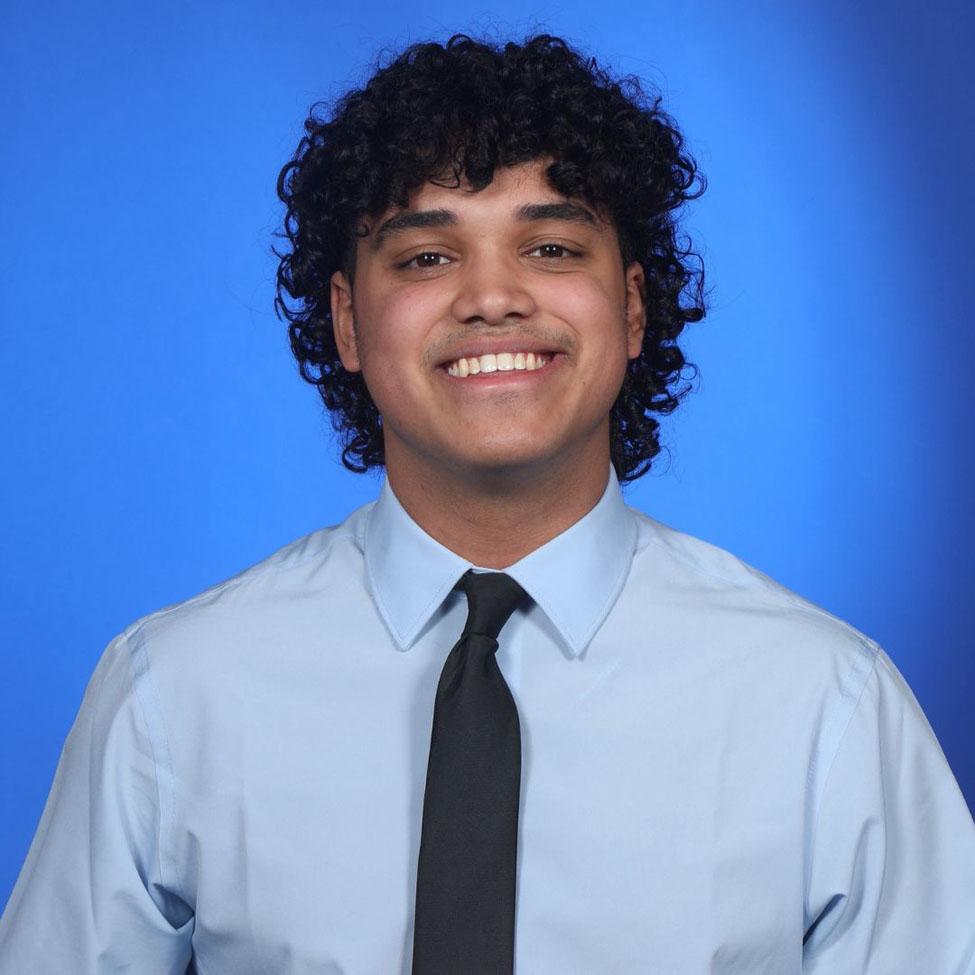
Pace Women’s Lacrosse Team Honored at White House
Pace University’s women’s lacrosse team joined college athletes from across the country at the White House on Monday to celebrate the team's 2023 NCAA National Championship.
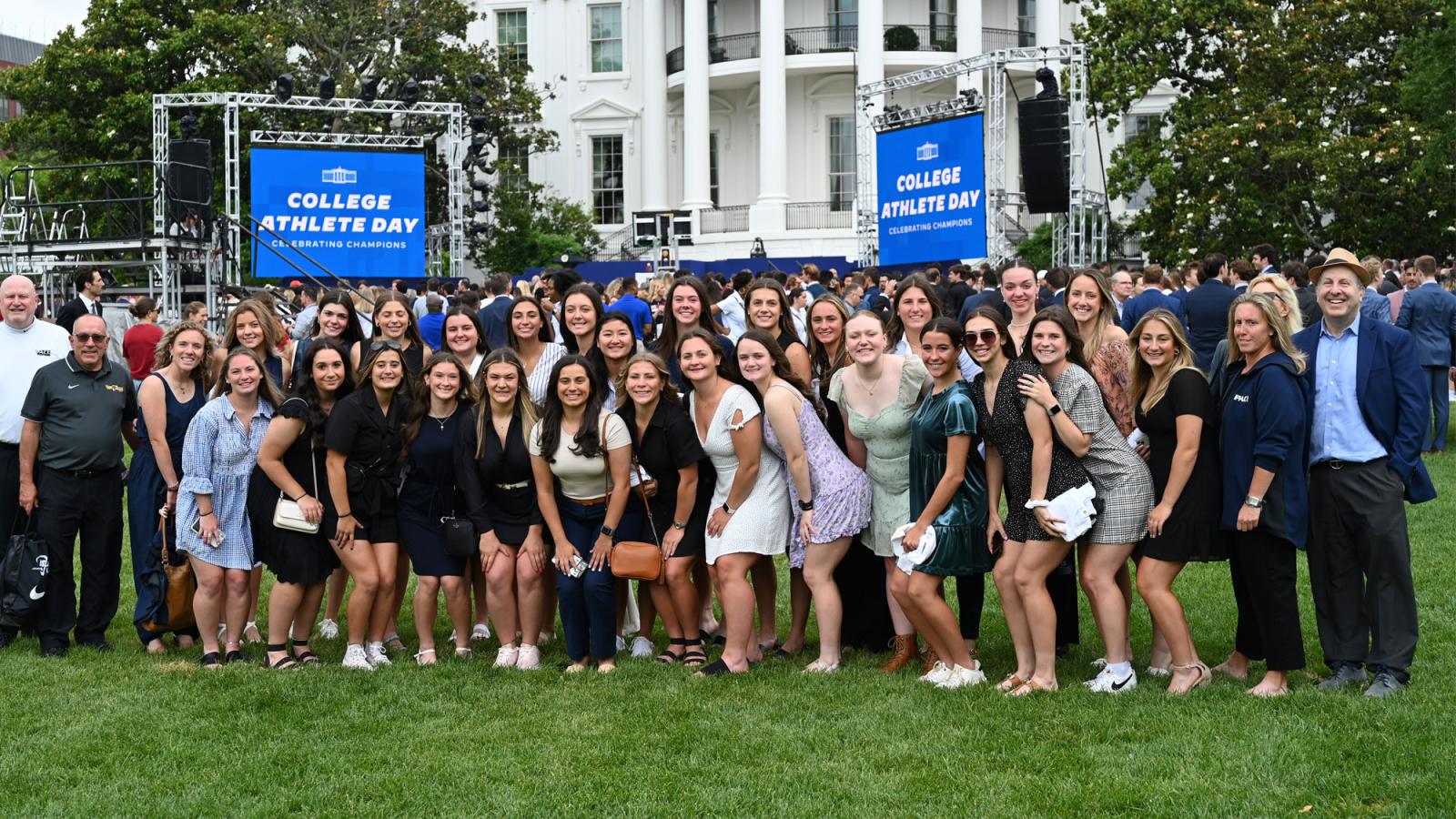
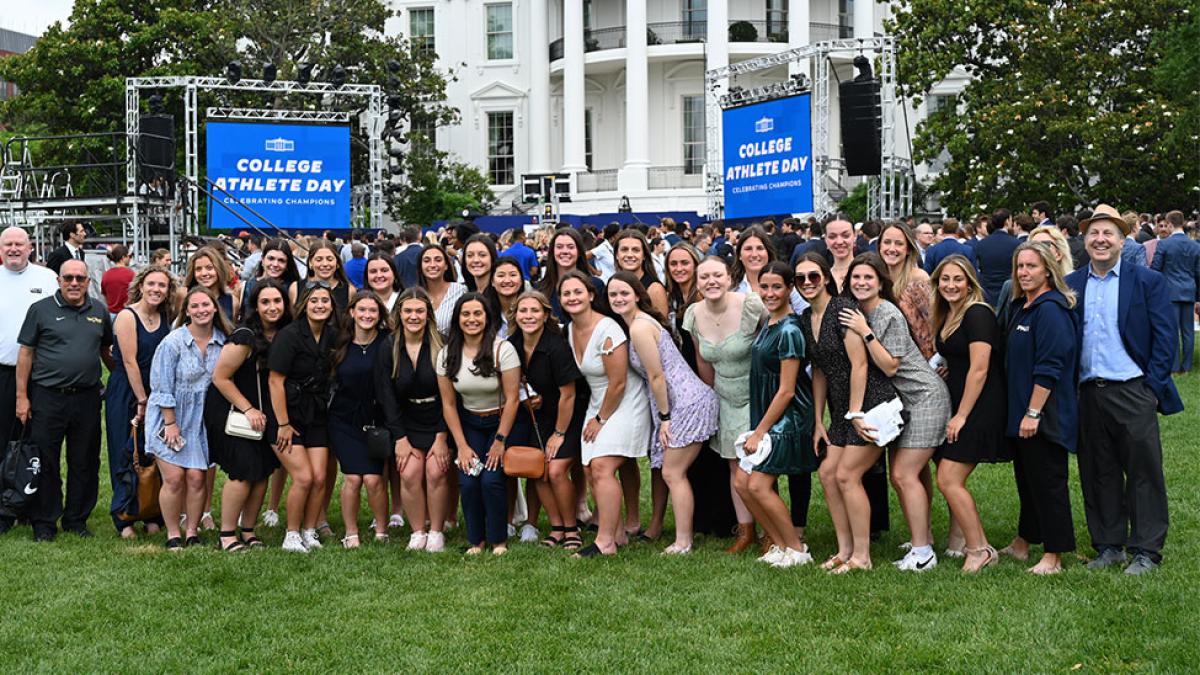
VP Harris: ‘You are leaders. You are role models. You are champions’
Pace wins national championship; marks first time in school history
PLEASANTVILLE, N.Y. June 12, 2023 – Pace University’s women’s lacrosse team joined college athletes from across the country at the White House on Monday to celebrate the team's 2023 NCAA National Championship.
The Setters joined 47 teams from schools across the country including University of Texas, Penn State, University of Virginia, Stanford University, and University of North Carolina, among others. The teams represented 19 sports from all three NCAA divisions—national championship winners—that were recognized on the South Lawn of the White House as part of "College Athlete Day."
“You made tremendous sacrifices—training through injuries, birthdays, vacations, and even a pandemic,” Vice President Kamala Harris told the crowd. “You know, all of you, what it means to commit and to persevere. And we know that so often, during the course of a long season, sports teams also become a family. You develop life-long relationships. You demonstrate teamwork and character. You make the people around you better in every way. You are leaders. You are role models. And, of course, you are champions.”
Pace University women's lacrosse team last month completed its historic season with a national championship, defeating No. 1 ranked West Chester University, 19-9, on May 21 in Indianapolis to win the first title in program history. The 19 goals scored by The Setters were the most-ever scored in a DII Women's Lacrosse championship game, and they are the first NCAA collegiate team in Westchester County to win a national championship.
“These outstanding student athletes embody the Pace go-getter spirit,” said Pace President Marvin Krislov. “We are excited for this historic accomplishment, and honored to celebrate it with Vice President Kamala Harris, and student athletes from across the nation. This is a fitting recognition—one they will remember for a lifetime.”
The Setters, who finished the season ranked No. 1 in the nation with a 21-2 record, won a staggering 17 games against ranked opponents during the 2023 season, including a Golden Rams team that came into the national championship game a perfect 22-0 on the year.
The visit to the White House was a tremendous honor for the program and the university, said Head Coach Tricia Molfetta, who is in her sixth year with the team.
“It was such an incredible honor to be welcomed to the White House by President Biden and Vice President Harris for College Athlete Day,” said Coach Molfetta. “It was amazing to see so many student-athletes together and join in celebrating all of our successes this academic year. I am so grateful we were able to end our year in such a monumental way and I know the experience today will be one this team will share with their friends and families for the rest of their lives.”
Kayla Conway, who graduated in May 2023, represented Pace on stage with Vice President Harris and student-athletes across the country.
“It truly was an honor to meet Vice President Kamala Harris and celebrate our athletic achievements with the NCAA community today,” Conway, of Wantagh, N.Y. “This is a monumental memory that I am beyond grateful for.”
“Being invited to the White House was truly an unforgettable experience and I am so glad I was able to share it with my whole team,” said Angelina Porcello, National Player of the Year, of Eastchester, N.Y. “It was an honor to celebrate our championship win alongside our fellow NCAA championship athletes.”
Emma Rafferty, of Bay Shore, N.Y. said: “It was so incredibly special to be welcomed to the White House in celebration of our national championship win. Being able to share this moment with my teammates and administrators will be a memory I will never forget.”
President Marvin Krislov, who joined the team for their visit to the White House, said he couldn’t be prouder of the women’s lacrosse team for bringing Pace its first national championship.
“These outstanding student athletes embody the Pace go-getter spirit,” he said. “We are excited for this historic accomplishment, and honored to celebrate it with Vice President Kamala Harris, and student athletes from across the nation. This is a fitting recognition—one they will remember for a lifetime.”
About Pace University
Since 1906, Pace University has been transforming the lives of its diverse students—academically, professionally, and socioeconomically. With campuses in New York City and Westchester County, New York, Pace offers bachelor, master, and doctoral degree programs to 13,600 students in its College of Health Professions, Dyson College of Arts and Sciences, Elisabeth Haub School of Law, Lubin School of Business, School of Education, and Seidenberg School of Computer Science and Information Systems.
Shipping and Shaping Success
As he enters his junior year pursuing a BBA in Finance at the Lubin School of Business, Diego Plaza '25 is committed to stepping out of his comfort zone to explore new interests and industries. His journey led him to an internship at the international shipping company MJLF & Associates, where Diego gets to use his skills and knowledge from Lubin to contribute meaningful work to the industry.
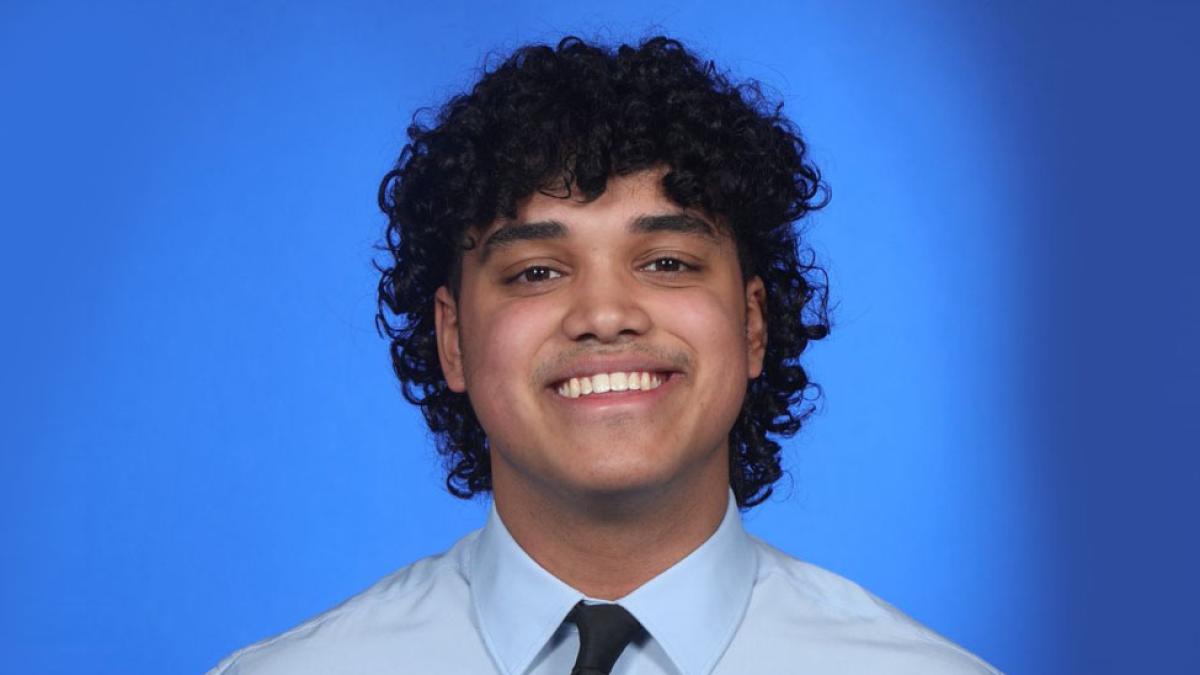
Diego Plaza
Class of 2025
Currently Studying: BBA in Finance with a minor in Communication Studies
Current Internship: Data Analysis, MJLF & Associates
Pronouns: He/Him

As he enters his junior year pursuing a BBA in Finance at the Lubin School of Business, Diego Plaza is committed to stepping out of his comfort zone to explore new interests and industries. His journey led him to an internship at the international shipping company MJLF & Associates, where Diego gets to use his skills and knowledge from Lubin to contribute meaningful work to the industry.
How has the Lubin School of Business helped you prepare for your current internship?
My professors and the Lubin School of Business staff have given me many resources to see what life is like in the business world. From work in class to extra resources outside the classroom, what they have taught me has prepared me for these moments.
What attracted you to this internship?
The oil and gas industry is lucrative. I don't think many people know the industry, but it's so large and there are so many opportunities. When this opportunity presented itself to me, I couldn't say no. Having the opportunity to take on a challenge so foreign to me was exciting. Being able to analyze tons of vessels worldwide and constantly update data was something that sounded fun and now, one month into this internship, I really enjoy what I do.
Having the opportunity to take on a challenge so foreign to me was exciting. Being able to analyze tons of vessels worldwide and constantly update data was something that sounded fun and now, one month into this internship, I really enjoy what I do.
Describe what a typical day looks like as an intern at MJLF & Associates.
Excel and Outlook take up a big part of my day. I spend most of my day on Excel, updating rates as our team gets new information. Data is ever-changing so always being on top of everything is a huge priority.
What has been the highlight or most enjoyable aspect of your internship so far?
The highlight of this internship so far has been finishing my Excel sheets. It's pretty relieving to see my work pay off. It's cool to see the accurate rates that I update used by my colleagues—it allows them to close deals and keep clients updated on the ever-changing rates. Being part of the process is fun.
How has this experience shaped or impacted your career goals?
This internship has shown me a new interest that I would like to pursue. The oil and gas industry is an industry with many opportunities that not many people I know have been presented with. Having the opportunity to take on such a challenge has almost made me addicted to learning as much about the industry as possible.
How will this experience impact your next semester at Lubin?
This experience makes me want to go further in my education. Seeing the people I work with and all of their accomplishments shows me anything is possible if you give your all towards anything in life. My colleagues are decorated in the field and seeing all they've done inspires me to work harder and achieve more.
Do you have any advice for other Lubin students who would like to pursue an internship in the future?
Find places that take you out of your comfort zone and take on that challenge. In my own experiences in uncomfortable situations where I'm not 100% confident in myself, pushing myself to learn as much as possible has made a world of difference.
Connect with Diego:
Pace Women’s Lacrosse Team Invited to White House
President Joe Biden and First Lady Jill Biden have invited Pace University’s women’s lacrosse team to the White House on Monday, June 12, to celebrate the team's 2023 NCAA national championship.
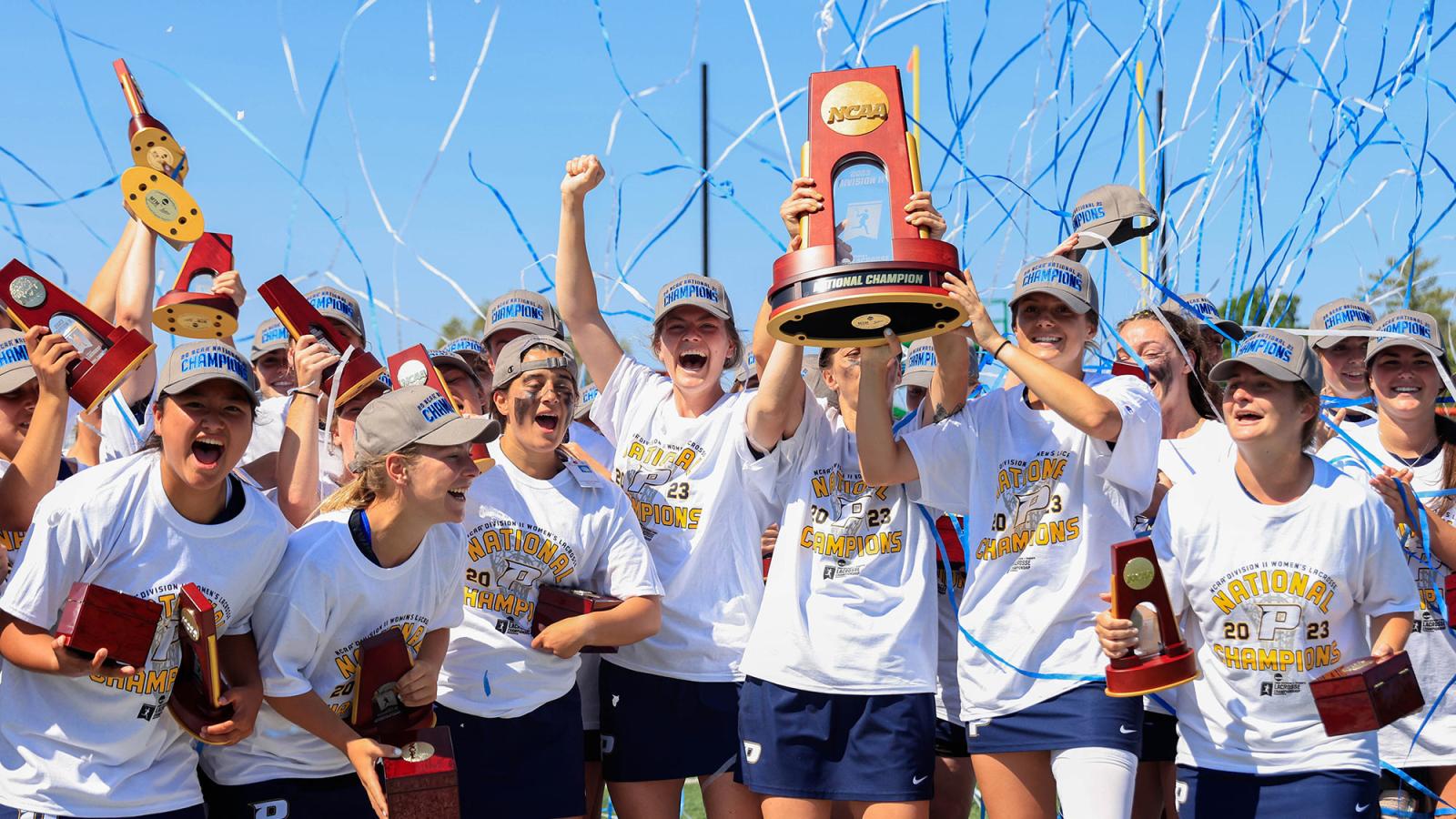

Team Wins Division II National Championship
Marks first time in school history
President Joe Biden and First Lady Jill Biden have invited Pace University’s women’s lacrosse team to the White House on Monday, June 12, to celebrate the team's 2023 NCAA national championship.
The Setters will be among many from the NCAA men's and women's national championship teams from across the country being recognized on the South Lawn of the White House as part of "College Athlete Day."
“We were incredibly honored to receive the invitation to the White House to commemorate our NCAA Championship team,” said Head Coach Tricia Molfetta, who is in her sixth year with the team. “This has been a year of so many firsts for our program and this feels like the most fitting ending to our once-in-a-lifetime season. When I first told the team they were invited, they were beyond excited and filled with emotion. This opportunity means so much to us and our Pace family.”
“I couldn’t be prouder of the national champions of our women’s lacrosse team,” said Pace President Marvin Krislov. “These outstanding student athletes embody the Pace go-getter spirit. We are excited for this historic accomplishment, and honored to celebrate it with President Joe Biden, First Lady Jill Biden, and student athletes from across the nation. This is a fitting recognition – one they will no doubt remember for a lifetime.”
Pace University women's lacrosse team last month completed its historic season with a National Championship, defeating No. 1 ranked West Chester University 19-9 on May 21 in Indianapolis to win the first title in program history. The 19 goals scored by The Setters were the most-ever scored in a DII Women's Lacrosse championship game, and they are the first NCAA collegiate team in Westchester County to win a National Championship.
The Setters, who finished the season ranked No. 1 in the nation with a 21-2 record, won a staggering 17 games against ranked opponents during the 2023 season, including a Golden Rams team that came into the National Championship game a perfect 22-0 on the year.
About Pace University
Since 1906, Pace University has been transforming the lives of its diverse students—academically, professionally, and socioeconomically. With campuses in New York City and Westchester County, New York, Pace offers bachelor, master, and doctoral degree programs to 13,600 students in its College of Health Professions, Dyson College of Arts and Sciences, Elisabeth Haub School of Law, Lubin School of Business, School of Education, and Seidenberg School of Computer Science and Information Systems.
As Americans Live Long, It’s Time For Them To Go Back To College—And For Colleges To Find New Ways To Serve Them
President Krislov writes in Forbes that older Americans who are living longer are a market for colleges:
Americans are living longer, and better, than ever before. Thanks to improved healthcare, longer lifespans, and other demographic and sociological changes, we can expect to remain active and engaged well into our retirement years—and it’s a trend that is only growing. Already there are about 55 million Americans over 65 (PDF), up from 35 million at the turn of the 21st century. And by 2040, nearly half the U.S. population will be 40 or older. Some 20 percent, almost 80 million people, will be over 65.
Senator Says: “Have Courage. Take a Risk Because Our Nation Needs You.”
The Westchester County Business Journal features Haub Law’s commencement and speaker Senator Elizabeth Warren.
Supreme Court: Hyper-Partisan, Ethically Challenged, and Lazy
Haub Law Professor Bennett Gershman discusses with Law and Crime some of the latest issues with the Supreme Court.
Puppies on the Block to be a New Tool for Abandoned Animals
Puppies on the Block, an extension of the well-established and award-winning Parenting, Prison & Pups Program, is serving as a puppy fostering and initial canine training program with incarcerated women and soon with incarcerated men, ages 18 to 25, in the Youth Opportunities Program (YOP).
Students from Elisabeth Haub School of Law at Pace University Lead Research Project Supporting New State Legislation for Village Incorporation
A team of students from the Elisabeth Haub School of Law at Pace University, supported by expert faculty, were commissioned by Senate Majority Leader Andrea Stewart-Cousins to lead an in-depth study of New York State law surrounding the village incorporation process. Their report, Incorporation in New York: Legislative Options for Reform, was presented to the Senate Majority Leader along with more than 20 Senators, Assemblymembers and legislative staff from across the State who were eager for the information and discussion regarding the proposed solutions.
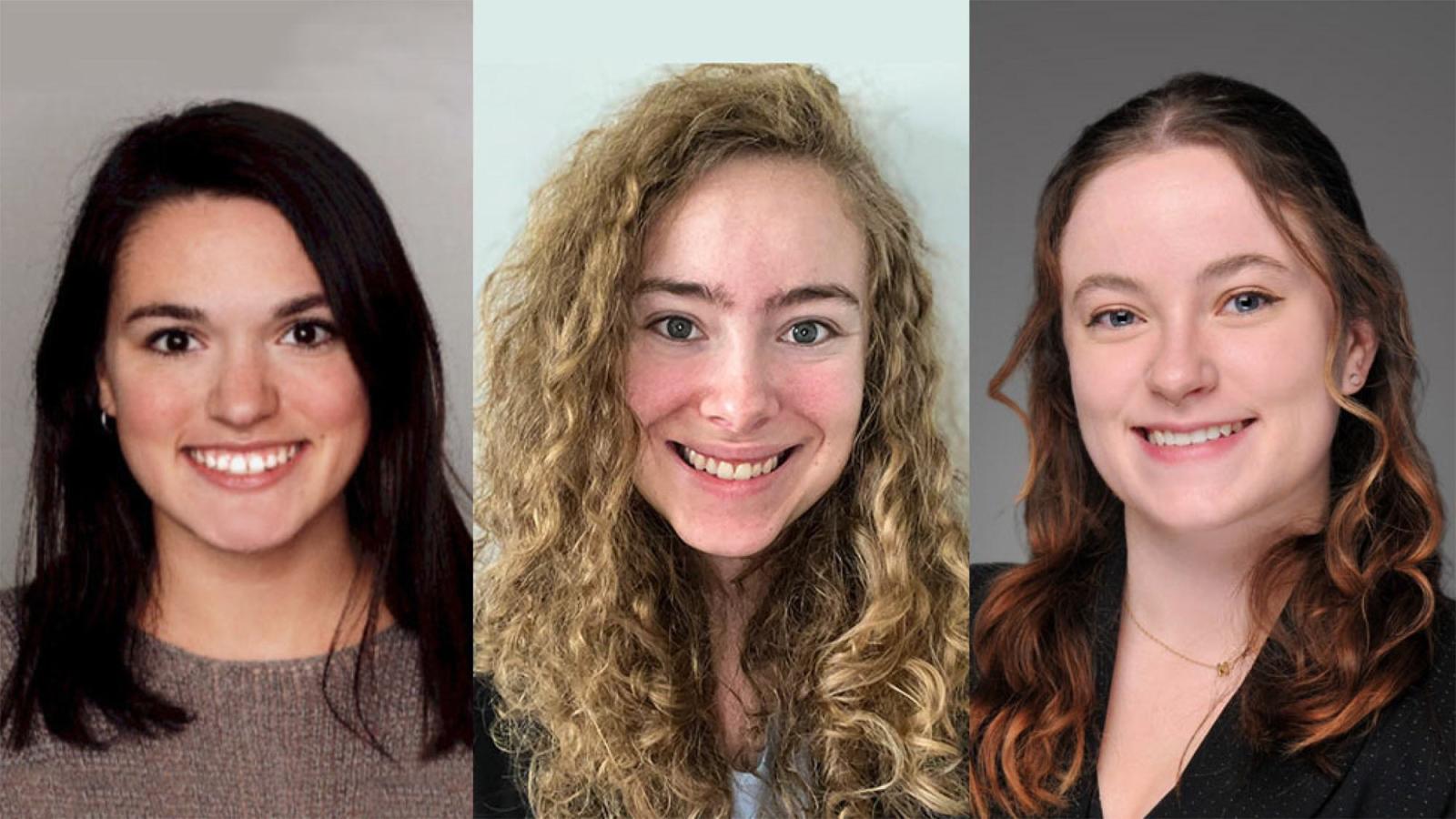
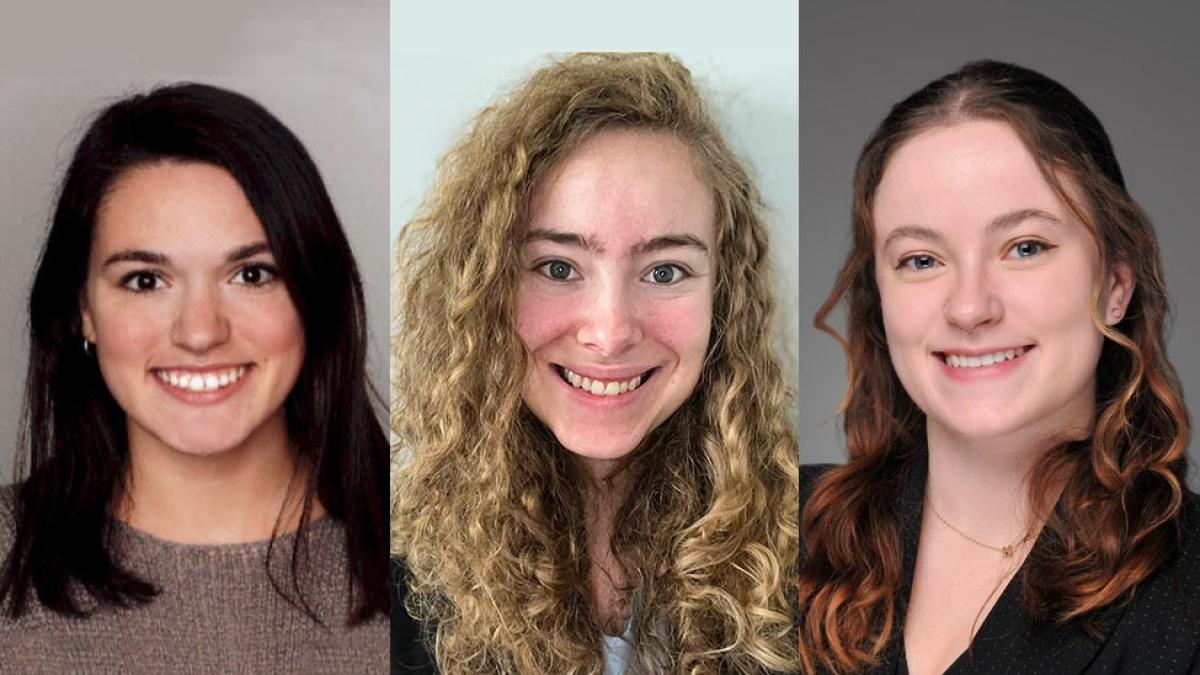
A team of students from the Elisabeth Haub School of Law at Pace University, supported by expert faculty, were commissioned by Senate Majority Leader Andrea Stewart-Cousins to lead an in-depth study of New York State law surrounding the village incorporation process. Their report, Incorporation in New York: Legislative Options for Reform, was presented to the Senate Majority Leader along with more than 20 Senators, Assemblymembers and legislative staff from across the State who were eager for the information and discussion regarding the proposed solutions.
Over the past several years, New York State has taken considerable steps to eliminate or reduce the number of local governments — streamlining the law to make it easier for citizens to undertake the process as well as providing financial incentives for communities that undertake consolidations and shared services. Yet, in Westchester County residents in the census-designated area of Edgemont have been seeking to become an incorporated village since 2019, citing land use decisions and costly settlements by the Town of Greenburgh. The ongoing debate has led to a broader dialogue on the subject among government leaders and cause to seek an outside perspective on the efficacy of New York State’s current incorporations laws.
Last year, Senator Stewart-Cousins, a proud alumnus who holds both a Bachelor’s Degree and Masters of Public Administration from Pace University, reached out to Haub Law Dean Horace E Anderson, Jr. to see if the Law School could help in the endeavor.
“The study came out of the State’s desire to ensure that the right formula for growth is in place for those villages seeking incorporation, taking into consideration a broader scope of issues than has been the case historically,” said Dean Horace E. Anderson, Jr. “This project was a great example of how our students experience law beyond the classroom. At Haub Law, we are not just training our students to be lawyers, but also to have an impact on their communities.”
Drawing upon it’s national reputation in land use law, Haub Law assembled a research team comprised of upper-level students Hailey Pedicano, Carly Hopkins, and Mia Petrucci, led by former Adjunct Professor Lester Steinman, a founding partner of the Municipal Law & Land Use group at McCarthy Fingar LLC, one of the most respected authorities on municipal law matters in the Lower Hudson Valley region. Research and data collection was supported by Jessica Bacher, Executive Director, Pace Land Use Law Center, Deborah L. Heller, Assistant Dean of the Law Library, and Vicky Gannon, Head of Collection Services/Reference Librarian.
The Haub Law team examined the incorporation procedures and requirements set forth in Article 2 of the Village Law and compared them with other states’ laws and New York law on annexation and dissolution. A 2020 Rockefeller Institute study served as the report’s research foundation and case studies and other literature on village incorporation were reviewed to better understand the reasons that motivate people to petition to incorporate. Bill research analysis further illuminated the rationale behind prior, unsuccessful efforts at legislative reform of the village incorporation process. The report concluded with research outcomes and several proposed options for legislative reform.
"I couldn't have received a better, more thought out, and data driven report," said Senate Majority Leader Andrea Stewart-Cousins. "Pace's recommendations are specific and include the rationale behind them. They provide a great roadmap as to how the current law, which is over 100 years old, should be updated. Several years ago we updated the state law on government consolidation, but we never updated the incorporation law. We now have a starting point, and I am pleased to say that the State Senate has just passed legislation incorporating several of their recommendations. My thanks and appreciation go to Dean Anderson, Lester Steinman and especially to the students, faculty and staff of Pace Law School."
Since its release, the Senate and Assembly have already passed two bills based on findings from the report and Governor Hochul is expected to vote on the new legislation in the coming weeks.
Read the report, Incorporation in New York: Legislative Options for Reform (PDF)
Professor Salihah Denman, Family Law Expert and Advocate, One of Four New Faculty Members Joining the Elisabeth Haub School of Law at Pace University
The Elisabeth Haub School of Law at Pace University is pleased to announce that Salihah Denman will join its faculty as a Visiting Assistant Professor of Law.
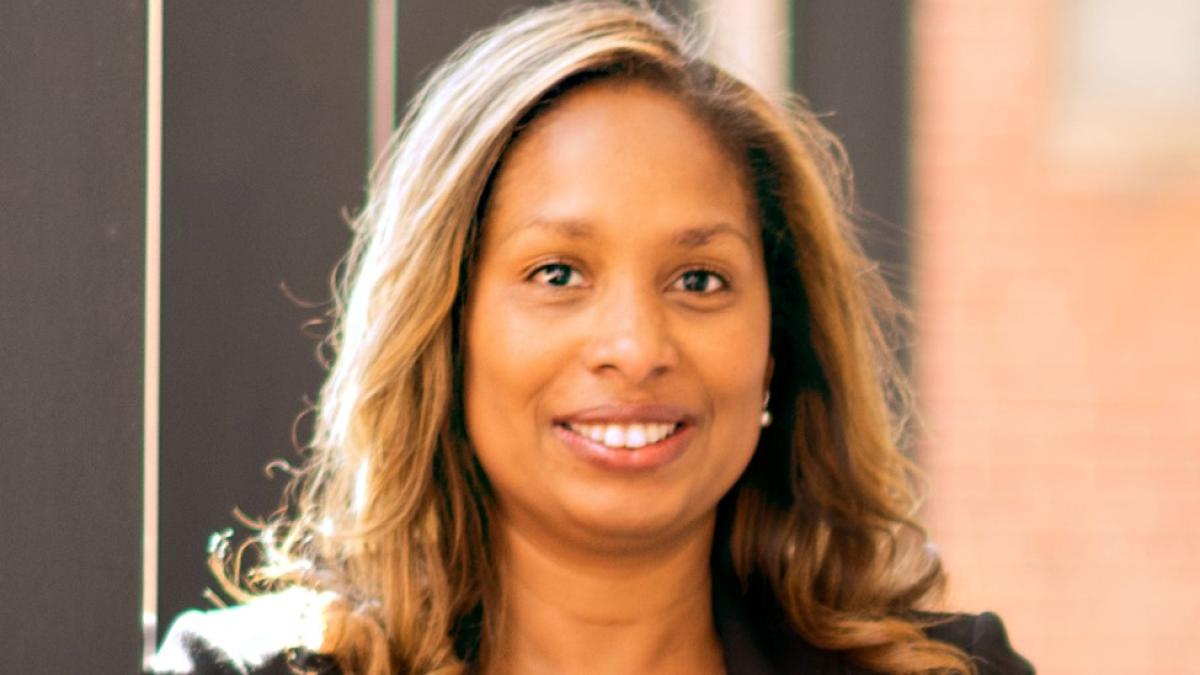
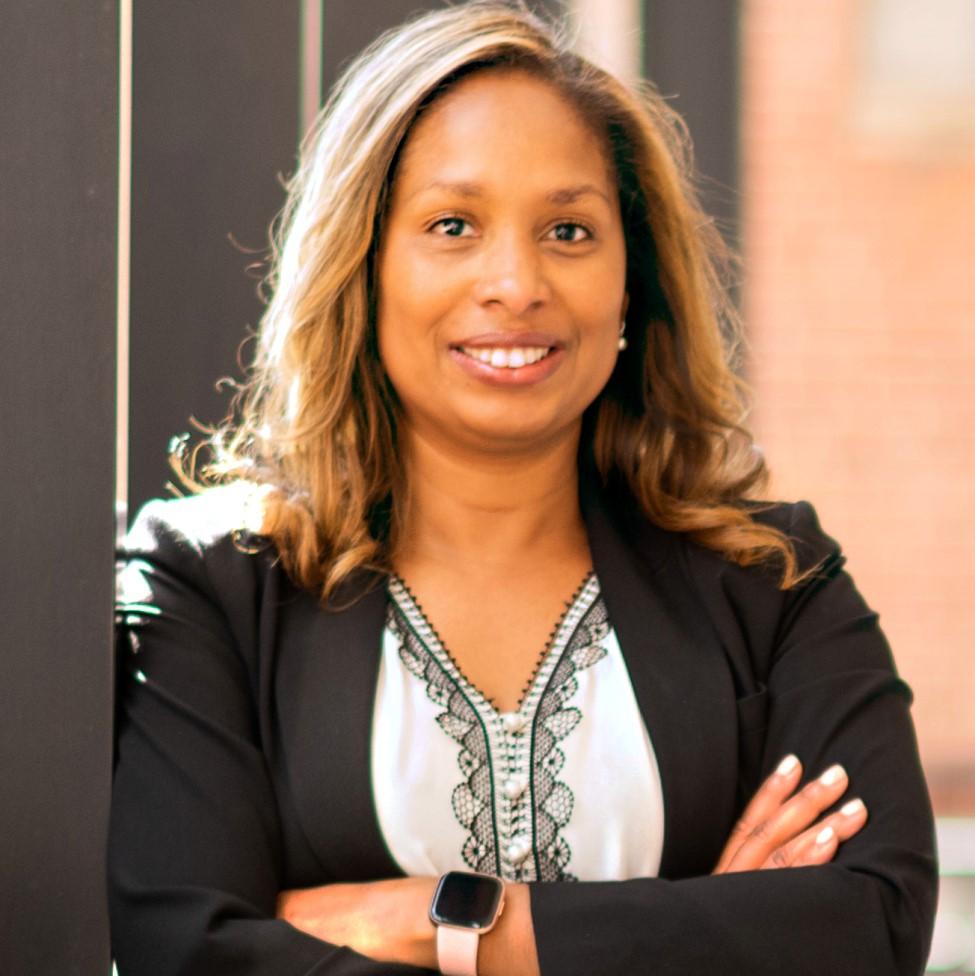
The Elisabeth Haub School of Law at Pace University is pleased to announce that Salihah Denman will join its faculty as a Visiting Assistant Professor of Law. Previously, Professor Denman served as an Assistant Professor at New York Law School, teaching Legal Practice and Family Law. Professor Denman also serves as the Director of Student Diversity Initiatives for the New York State Judicial Institute and Director of the Institute’s New York Legal Educational Opportunity (“NY LEO”) program. Professor Denman is one of four new faculty members who will be joining Haub Law this fall.
“Family Law is something that I am passionate about, and I am excited to bring my experience and knowledge in this arena to the Elisabeth Haub School of Law,” said Professor Denman. “I have been fortunate enough to have enjoyed a relationship with Haub Law in my capacity as Director of the New York State Judicial Institute’s New York Legal Educational Opportunity and I am eager to join Haub Law in this new capacity as a Visiting Professor.”
Prior to entering academia, Professor Denman was a private practitioner and focused her practice on Appellate Advocacy. Her professional experience also includes serving as an Assistant County Attorney for the Westchester County Attorney’s Office, Family Court Bureau and as an Agency Attorney for the Administration for Children’s Services. She is also the State Coordinator for the National Association of Counsel for Children. She is the founder and Co-Chair of the Children and the Law Section for the Metropolitan Black Bar Association. This section is the first and only affinity bar association section focused on the rights of children in New York State.
Professor Denman is certified as an Attorney for Children in the First, Second, and Third Departments, as well as an Attorney for Minor Children in Connecticut Professor Denman serves on the Office of Attorneys for Children Advisory Committee in the Third Judicial Department. She is a guest lecturer for the Second Department, Office of Attorneys for Children and assists in developing Continuing Legal Education programming on a volunteer basis. She mentors law students through the Appellate Project and has co-coached the Black Law Student Association’s Moot Court Team at New York Law School.
At Haub Law, Professor Denman will teach Family Law and Children and the Law. “Professor Denman’s ability to bring her practical experience and expertise into the classroom is something our students at Haub Law will benefit tremendously from,” said Elisabeth Haub School of Law at Pace University Dean Horace E. Anderson Jr. “Professor Denman is a change-maker in the area of Family Law and we are thrilled to have her join Haub Law as a Visiting Assistant Professor.”
Professor Denman is a proud member of Delta Sigma Theta Sorority, Inc and Epsilon Sigma Iota Sorority, Incorporated, the first legal sorority dedicated to the advancement of black women She is a first-generation immigrant from Suriname, South America and is fluent in Dutch. Professor Denman is a graduate of Howard University School of Law and earned an LL.M. from American University, Washington College of Law.
Finding New Skills in Florence
Morgan Brandt '24 isn't wasting any time this summer. Not only is she taking classes that will help her complete her degree in Arts and Entertainment Management, but she's doing it in a new country, gaining international business experience that will help launch her career upon graduation.


Morgan Brandt
Class of 2024
Currently Studying: BBA in Arts and Entertainment Management
Studying Abroad At: Florence University of the Arts in Florence, Italy
Pronouns: She/Her
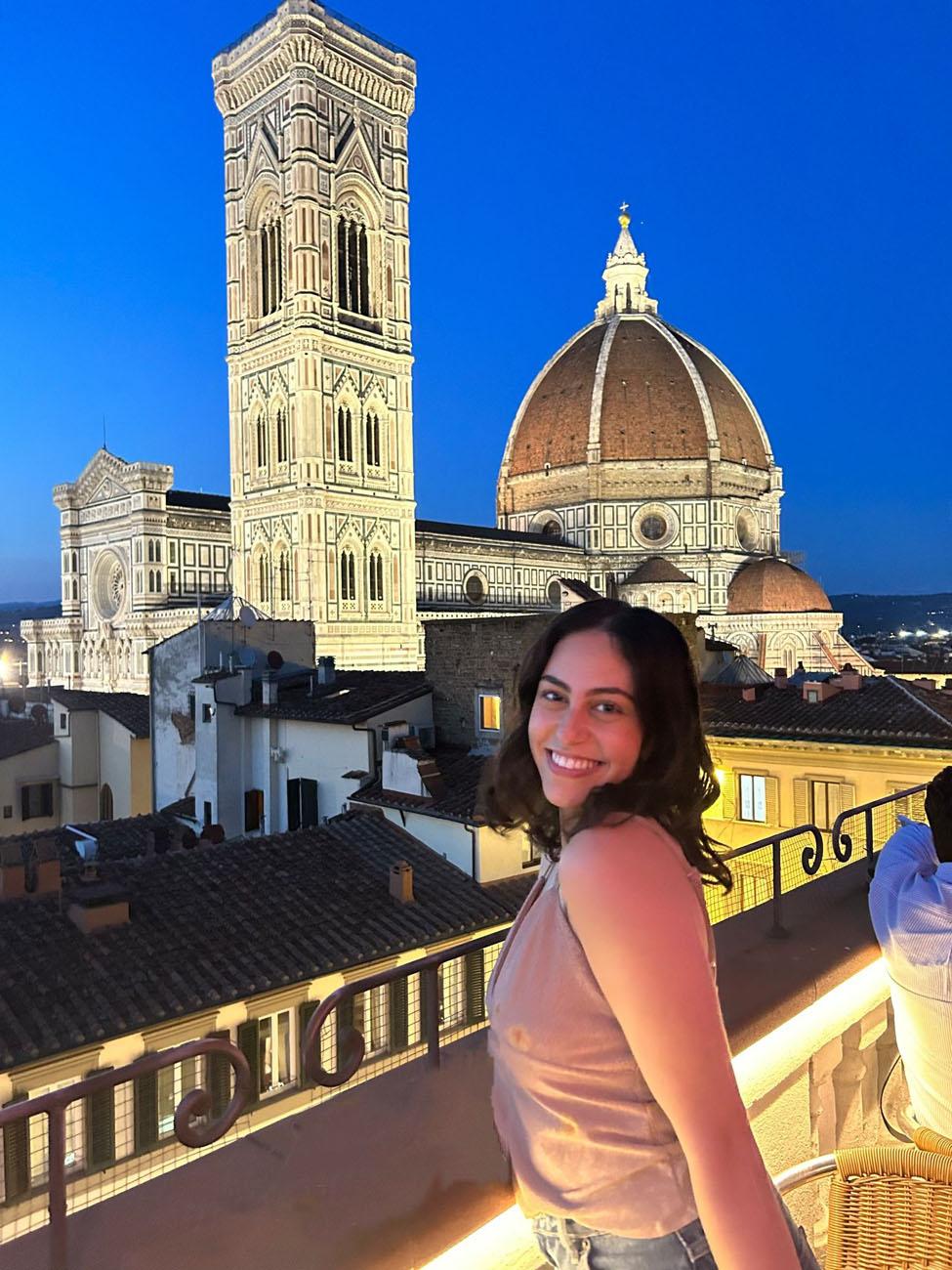
Morgan Brandt isn't wasting any time this summer. Not only is she taking classes that will help her complete her degree in Arts and Entertainment Management, but she's doing it in a new country, gaining international business experience that will help launch her career upon graduation.
What motivated you to study abroad?
I've always wanted to study abroad, and I've always wanted to go to Italy, so I figured I would make it happen this summer!
How has the Lubin School of Business helped you prepare for your courses abroad?
The Lubin School of Business helped to prepare me for my course abroad by encouraging me to take chances and be part in opportunities like this throughout the years.
What has been the highlight or most enjoyable aspect of your time abroad so far?
So far, the highlight of this experience is simply being able to see the world. I have not traveled much in my life, so I am grateful that I was able to do this. It is so easy to travel within Italy.
How has this experience shaped or impacted your career goals?
This experience has shaped my career goals in many ways. Studying abroad has exposed me to a completely different culture and perspective. It has helped me gain exposure that will enable my ability to learn how to appeal to global audiences and learn how the entertainment industry works in another country. It also has provided me with a new community for networking and making connections with people I would never have met otherwise. Although I was only in Florence for a few weeks (versus a semester), I still feel that I learned a lot about myself, my passions, and my strengths.
Studying abroad has helped me gain exposure that will enable my ability to learn how to appeal to global audiences and learn how the entertainment industry works in another country. It also has provided me with a new community for networking and making connections with people I would never have met otherwise.
How will getting international business school experience impact your next semester at Lubin?
I have a more global perspective on social, political, and cultural issues because of this international business school experience. Having this broader understanding sparked a new interest of mine and inspired me to study and learn more about topics I've never thought too much about before.
What is one skill or piece of knowledge that you learned abroad that you will bring back to Lubin with you?
Some skills I will be bringing back with me are adaptability and resilience. Living and studying in a foreign country requires these skills, along with problem-solving. I can transfer these qualities to my studies at Pace along with my chosen career industry of Broadway and entertainment. These environments can be fast-paced and overwhelming at times, so the ability to navigate challenges is essential.
Do you have any advice for other Lubin students that are considering studying abroad?
If you are even remotely considering studying abroad, you should do it! Take advantage of the opportunities like this that Pace has to offer. You can always travel, but you can't always study new and interesting topics in a foreign country while living there and making friends from around the world.
Connect with Morgan: